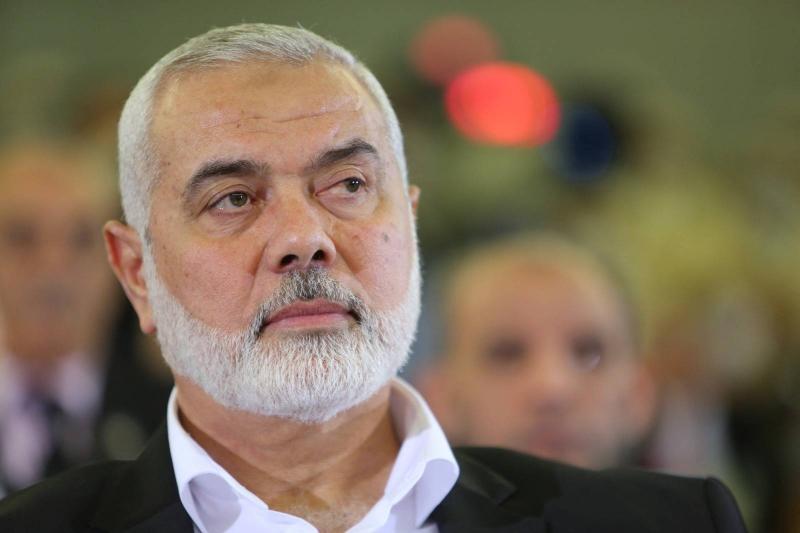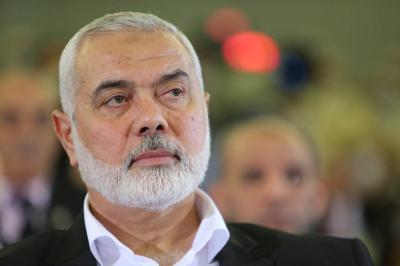Three sons of Ismail Haniyeh, the head of Hamas's political bureau (Hazem, Amir, and Mohammed), along with three of his grandchildren, were killed in an Israeli airstrike targeting a car in the al-Shati refugee camp in western Gaza. In his first comment after the incident, Haniyeh stated: "The enemy believes that by targeting the children of leaders, it will break the will of our people. We tell the enemy that this blood will only increase our steadfastness in our principles and our attachment to our land."
Ismail Haniyeh married his cousin Amal Haniyeh when she was around sixteen years old, and unlike her husband, she did not complete her education. However, Haniyeh continued his studies with the help of his uncle and his wife’s father. Together, they have thirteen children. Below are the names of their five daughters:
- Sana: Born in 1986
- Buthaina: Born in 1987
- Khawla: Born in 1992
- Latifa: Born in 1998
- Sara: Born in 2004
As for Haniyeh's sons, he has around eight children from his wife Amal Haniyeh, listed as follows:
- Abdul Salam: Born in 1981
- Hammam: Born in 1983
- Wissam: Born in 1984
- Muath: Born in 1985
- A’id: Born in 1994
- Hazem: Born in 1994, killed today in the Israeli airstrike
- Amir: Born in 1995, killed today in the Israeli airstrike
- Mohammed: Born in 1996, killed today in the Israeli airstrike
Ismail Haniyeh's wife, Amal Haniyeh, was born and raised in the al-Shati camp in Gaza in 1963. Observers describe the Hamas political bureau leader, who lives in voluntary exile between Qatar and Turkey, as a "calm" man with a "measured and open" discourse towards various factions, even those competing with his movement. However, his properties outside Gaza, the extent of his wealth, its sources, and his political ambitions in Palestinian territories raise many questions. The United States listed him as a "terrorist" in 2018. His name re-emerged in international media following Hamas's attack on Israel, which resulted in hundreds of casualties, while Israel retaliated with deadly airstrikes that killed over 3,700 people.
So who is Haniyeh?
Ismail Haniyeh, 60 years old, was elected as the head of Hamas's political bureau in 2017, succeeding Khaled Mashal. His name and nickname (Abu al-Abd) became known worldwide in 2006 when he became the Prime Minister of the Palestinian Authority after Hamas's surprise victory in the parliamentary elections. However, the understanding with Fatah, led by President Mahmoud Abbas, did not last long, as Hamas forcibly took control of the Gaza Strip the following year. Haniyeh, who lives in voluntary exile between Qatar and Turkey (which support his movement), has long called for a combination of armed resistance and political struggle within Hamas, which is classified as a terrorist organization by the United States, the European Union, and Israel.
Haniyeh also maintains good relations with leaders of various Palestinian factions, even those rivaling his movement. He has been arrested multiple times by Israel, notably in 1989, and was expelled along with several Hamas leaders to southern Lebanon in 1992.
**His Upbringing, Education, and Political Activity:**
Ismail Abd al-Salam Ahmad Haniyeh was born on January 23, 1962, in Gaza at the al-Shati refugee camp, where his family sought refuge from the village of al-Jura in Ashkelon in 1948. He received his primary and secondary education in schools run by the United Nations Relief and Works Agency for Palestine Refugees (UNRWA), before obtaining his high school diploma from al-Azhar Institute. He then enrolled in the Islamic University of Gaza in 1987, graduating with a degree in Arabic literature, and became its dean in 1992. In 1997, he took over the leadership of Sheikh Ahmed Yassin's office after Israel released him.
**His Wealth and Funding Sources:**
The Times estimates Haniyeh's wealth at around four billion dollars. The newspaper, which interviewed Haniyeh a year ago, reported that Iran funds the Palestinian leaders with 100 million dollars annually. It also noted that Palestinian polls anticipated Haniyeh as the frontrunner to succeed Mahmoud Abbas as head of the Palestinian Authority. A survey conducted by the Palestinian Center for Policy and Research in September indicated that if new elections were held, Haniyeh would receive 58% of the votes compared to only 37% for Abbas.
Following Hamas's launch of "Operation Al-Aqsa Flood" on Saturday, October 7, the most deadly surprise attack since the establishment of Israel, Haniyeh stated: "We are awaiting a great victory," adding: "Enough is enough; we must continue the cycle of uprisings and revolutions in the liberation battle."
Haniyeh has repeatedly emphasized the threats faced by the Al-Aqsa Mosque in Jerusalem, the ongoing Israeli siege of Gaza, and Israeli normalization with regional countries. After Israel launched strikes on the Gaza Strip and urged its residents to evacuate the northern region and flee southward, Haniyeh asserted that Israel's "aggression" against Gaza amounted to "war crimes," calling for pressure on Israeli authorities to "immediately stop these crimes and respect international humanitarian law." He also stressed that "there will be no migration from Gaza," adding: "The people of Gaza are rooted in their land; they will not leave Gaza or emigrate no matter what you do, O killers, O criminals."
It is noteworthy that the political leadership of Hamas relies on two figures: Ismail Haniyeh from abroad and Yahya Sinwar, his counterpart in Gaza, who is seen as a symbol of the hardline wing of the movement. Meanwhile, the Izz ad-Din al-Qassam Brigades, the military wing of the movement, is led by Mohammed Deif, a figure who rarely appears publicly and has repeatedly survived Israeli assassination attempts.




